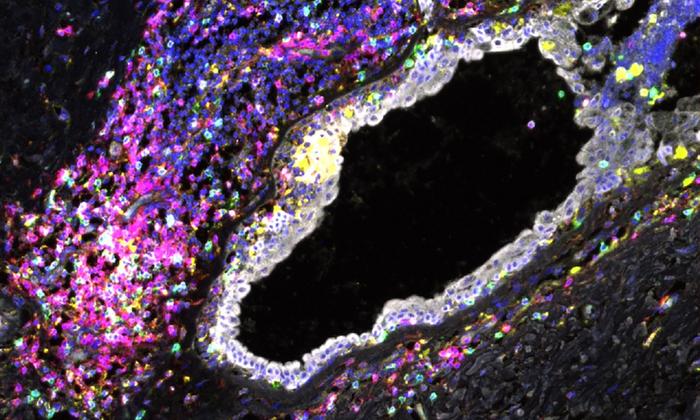Could immunotherapy prevent breast cancer before it starts?
2024-04-01
免疫疗法上市批准临床研究

Preview
来源: FierceBiotech
Exhausted immune cells in a sample of breast tissue of someone with a BRCA mutation
The discovery was detailed in a journal article published March 28 in Nature Genetics. A team of researchers from Cambridge University detailed how they found the cells in the course of developing the Human Breast Cell Atlas, a project that aims to catalog the vast array of biological changes that human breast cells undergo in response to age, pregnancy, breastfeeding, menopause and gene mutations.
“Our results suggest that in carriers of BRCA mutations, the immune system is failing to kill off damaged breast cells—which in turn seem to be working to keep these immune cells at bay,” Walid Khaled, Ph.D., senior author of the article, said in a press release. “Drugs already exist that can overcome this block in immune function, but … no one has really considered using them in a preventative way before.”
BRCA mutations are among the best known and most substantial risk factors for breast cancer. Between 55% and 72% of women with a BRCA1 mutation will develop breast cancer at some point, as will 45% to 69% of women with a BRCA2 mutation, according to the U.S. National Cancer Institute. Given that the cancer is nearly guaranteed, some women who learn they carry the mutation opt to have their breasts removed prophylactically in a procedure called a double mastectomy—a decision that has seen its profile raised in recent years thanks to celebrities like Angelina Jolie.
But the discovery of malfunctioning immune cells in the tissue of patients with BRCA mutations could lead to a different approach. Technically, the immune cells are described as “exhausted,” meaning they may no longer work optimally. This leaves wayward breast cells free to proliferate into tumors.
Immunotherapies could offer a solution because they work by restoring a patient’s immune system to fight cancer. Two of them—Merck’s Keytruda and GSK’s Jemperli—are approved for triple-negative breast cancer, a less common and more aggressive form of the disease that’s more common in people with BRCA1 mutations.
The cancer organization Cancer Research UKCancer Research UK has awarded the Cambridge team a grant to study whether immunotherapies can prevent the disease in mouse models with BRCA mutations, according to the release. In an emailed comment to FBR, Khaled did not name any specific drugs that would be evaluated, but said the team planned to test a variety of immunotherapies that will be assessed as the project progresses.
Editor's note: This story was updated on April 1, 2024 with details about the upcoming study in animal models.
更多内容,请访问原始网站
文中所述内容并不反映新药情报库及其所属公司任何意见及观点,如有版权侵扰或错误之处,请及时联系我们,我们会在24小时内配合处理。
来和芽仔聊天吧
立即开始免费试用!
智慧芽新药情报库是智慧芽专为生命科学人士构建的基于AI的创新药情报平台,助您全方位提升您的研发与决策效率。
立即开始数据试用!
智慧芽新药库数据也通过智慧芽数据服务平台,以API或者数据包形式对外开放,助您更加充分利用智慧芽新药情报信息。




